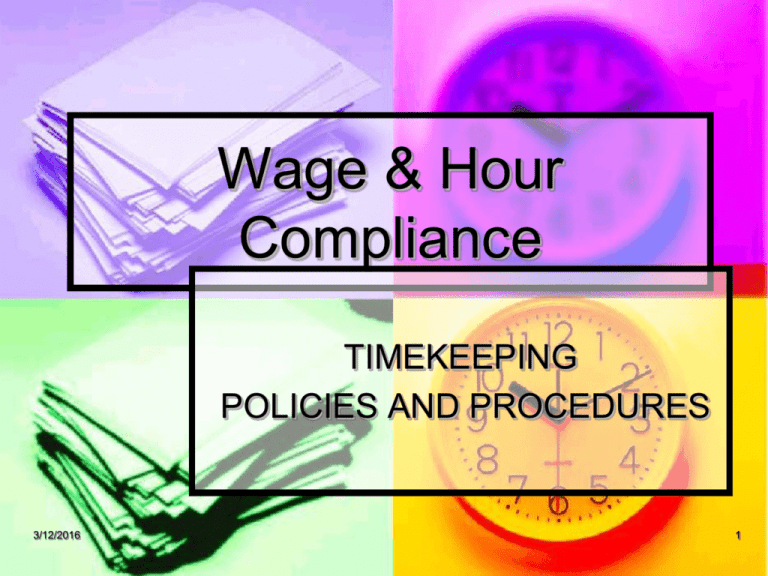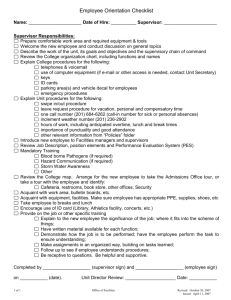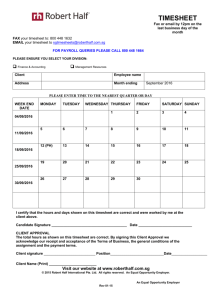Wage & Hour Compliance: Timekeeping Policies & Procedures
advertisement

Wage & Hour Compliance TIMEKEEPING POLICIES AND PROCEDURES 3/12/2016 1 Why the Training? 3/12/2016 The University must comply with Federal and State Wage and Hour laws for Non-Exempt employees Ensure consistent application of time/record keeping practices and payment of overtime for non-exempt employees in accordance with University policies (non-union) and applicable CBAs (union) 2 New York State Labor Law 195 All employers in New York State are required to inform employees hired on or after October 26, 2009 when they will be paid how frequently they will be paid the rate per pay period. Non-Exempt vs. Exempt Non-Exempt Exempt (from Overtime) 3/12/2016 Paid on a hourly basis (no lump sum payments allowed) Receive checks bi-weekly Paid for overtime based on weekly hours worked (time and a half for hours in excess of 35 per week under applicable CBAs and University policy) Complete timesheets Must take and record lunch period Must record all hours worked Paid on a salaried basis Not paid by hours worked/daily hours are not recorded Not legally required to take lunch and breaks All exempt employees need to be compensated on a salaried basis at a rate of not less than $455 per week 4 Criteria for Non-Exempt Work Work is typically categorized as clerical in nature: filing, filling out forms and preparing routine reports, answering telephones, making travel arrangements, copying, data entry and processing Many clerical workers also exercise some discretion and judgment in their jobs. However, what distinguishes this from Exempt work is that the exercise of judgment and discretion must be about matters of considerable importance to the operation of the department or Columbia University as a whole. 5 Criteria for Exempt Work Typically involves the exercise of discretion and judgment, with the authority to make independent decisions on matters which affect the department as a whole or a significant part of it, or the University generally Have the authority to formulate and/or interpret university policies; has authority to waive or deviate from established policies and procedures without prior approval Have the authority to commit the University in matters which have significant financial impact; has authority to negotiate and bind the School/University on significant matters Is involved in planning long- or short-term business objectives Have the authority to hire or fire other employees, or the employee’s suggestion and recommendations as to the hiring, firing, advancement, promotion or other change of status must be given particular weight 6 Job Descriptions Job descriptions for all employees, including hourly casual and student workers, must be evaluated for exempt or non-exempt status 7 Hours of Work 3/12/2016 Normal business hours set by department Generally, University business hours are 9 a.m. until 5 p.m. - seven hours per day/35 hours per week (varies based on department and area) Supervisor & subordinates can agree on variations providing business needs are met (e.g., 8:30 – 4:30; 9:30 – 5:30) Employee should arrive on time and adhere to their schedule Unpaid meal break is required if work shift is 5 hours or longer 8 Overtime Must be approved in advance by supervisor or management level designee OT must be paid at time and a half for hours worked in excess of 35 hours in a workweek Comp time in lieu of OT is allowed for 2110 members. Must be used within 60 days from the time worked or paid out at the rate of time and a half If unapproved overtime is worked, it must be paid and then dealt with as a performance management issue Compensation for All Hours Worked 3/12/2016 Normal commute to and from work is not compensable Travel required by employer in order to attend meetings or other work-related activities is compensable Working before or after-business hours, from home, during lunch Supervisors must be aware of & anticipate the potential for overtime costs for non-exempt employees 10 Time Records 3/12/2016 Must document exact start and end times Timesheets should be completed on a daily basis and submitted to the supervisor on a weekly or bi-weekly (depending on pay period) Supervisor or pre-arranged management level designee must sign timesheet every pay period Must reflect ALL hours worked. Supervisor is responsible for managing and approving all hours worked. 11 Time Sheet Instructions Estimating/rounding time Running department errands Do not round the time to make it easier to add, i.e. 8:07 to 8:15 Record the exact start and end work times Not done during lunch hour Lunch begins/ends when errand is done/started Meal Break Is generally 1 hour (minimum of 30 minutes) Record exact lunch times Time Sheet Instructions Extended lunch period Time off with pay Record exact times Use designated absence codes, I.e., “V”, “H”, etc. Leaving Early / Arriving Late 3/12/2016 Must be approved by supervisor in advance Record exact times on the timesheet Get prior supervisor approval Dr. appointment Where appropriate use paid time off (consult HR or CBA if applicable) Record exact times Personal appointment Record exact times Make up time with approval 13 New Casual Timesheet Facts & Tips for Supervisors 3/12/2016 It is the responsibility of the Supervisor to ensure that time sheets accurately reflect the time worked The Supervisor’s signature on the timesheet signifies that s/he has reviewed and approved the time entered on the timesheet If there is a problem with the timesheet, the Supervisor should talk to the employee and resolve the problem before signing the timesheet 15 Questions? 3/12/2016 16 Other University Initiatives Doing The Right Thing Ethnicity and Race Self Identification





